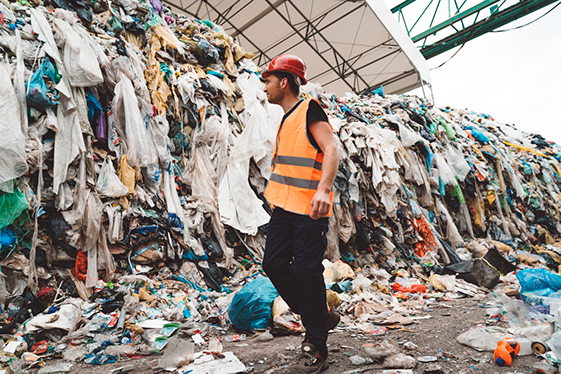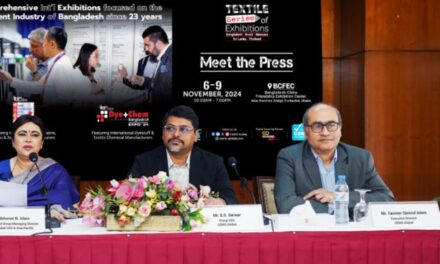 The absence of a comprehensive policy framework for circular textiles, which would incentivise the recycling of post-industrial textile waste known as jhut, is causing Bangladesh to forgo $5 billion in potential annual export revenues from recycled textile products, according to a recent study.
The absence of a comprehensive policy framework for circular textiles, which would incentivise the recycling of post-industrial textile waste known as jhut, is causing Bangladesh to forgo $5 billion in potential annual export revenues from recycled textile products, according to a recent study.
The study titled ‘Regulatory framework to enable recycling of post-industrial waste (jhut) for the RMG industry in Bangladesh said that to harness its potential for innovation and industrial advancement through the circular economy, Bangladesh’s textile industry must formalise the informal jhut sector, though political economy challenges have impeded an inclusive and just transition.
The study estimated that Bangladesh’s current annual recycling capacity for apparel-grade yarns was between 18,000 and 24,000 tonnes, which represented only about 5-7 per cent of the 3,30,000 to 5,00,000 tonnes of 100 per cent cotton and cotton-elastane waste produced each year.
It said that less than 5 per cent of this waste was upcycled into products like rag rugs, rag dolls, and blankets and a substantial portion — over 55 per cent — was exported to recycling companies worldwide, while the remaining waste was downcycled into stuffing materials for cushions and mattresses, incinerated onsite for energy recovery, or, in negligible amounts, sent to landfills.
The study was jointly conducted by the Gesellschaft für Internationale Zusammenarbeit (GIZ) GmbH and H&M under the programme for sustainability in the textile and leather sector. The report outlined measures and regulatory reforms necessary to establish an effective management framework for jhut aiming to maximise economic, social, and environmental benefits within Bangladesh’s jhut supply chain.
It recommended collaborative stakeholder engagement, protection of workers’ rights and safety, promotion of circular textile economy practices, and capacity building and technology adaptation to transform the jhut sector. The report also outlined a number of key policy solutions for the informal jhut sector that include improving data availability, transparency and traceability through a national jhut database, introducing industry guidelines for jhut management and recycling standards and revising value-added tax and tariff rules for jhut transactions.
It also suggested providing economic incentives to formalise jhut collection, handling and sorting, establishing central depository systems and cluster-based sorting hubs to promote decent work and social inclusion and enhancing the investment environment for advanced recycling technologies. Current disposal methods result in severe environmental impacts, such as air pollution, resource depletion, and harmful chemical leaching, which pose significant threats to ecosystems and public health, the report mentioned.
The survey pinpointed key challenges in Bangladesh’s recycling industry including sorting jhut, timely disposal, boosting productivity and minimising waste through improved design. It also identified potential threats if factory owners implement jhut recycling strategies on their own premises. Potential threats to jhut recycling include political restrictions, general pressures, increased scrutiny, internal recycling disruptions and intimidation from those benefiting from the status quo.
Faruque Hassan, former president of the Bangladesh Garment Manufacturers and Exporters Association, said that the textile industry in Bangladesh had begun recycling and it would yield very positive results in the near future. ‘We lack core raw materials like cotton and petrochemicals, but strengthening our recycling industry could reduce import costs and create a robust backward linkage industry for the country,’ he said. Faruque said that sorting jhut was a major challenge due to a lack of trained personnel, though the sector had already provided training to many with support from GIZ and H&M.
He also highlighted the importance of establishing jhut collection points for the industry’s transition, mentioning that the BGMEA proposed this but implementation has been stalled due to political reasons. ‘In the global context, an evolving narrative around sustainability in the textile sector is shaping the operations and strategies of major brands. A pronounced push towards integrating circularity in value chains is evident, with entities such as H&M and GIZ at the forefront of these initiatives,’ the report said.
Regulatory bodies, particularly in the European Union, are moving towards stricter mandates and introducing extended producer responsibility requirements, it mentioned.
The study suggested that this global shift offered Bangladesh a chance to boost trade through sustainability goals and create formal employment by formalising the jhut sector and adopting circular economy models. To transform the report recommended for the enhanced collaboration among government bodies, manufacturers, non-government organisations and recycling companies is essential for developing sustainable infrastructure, adopting innovative technologies and establishing efficient waste management systems.
It also suggested that enforcing existing labour laws and introducing new regulations are crucial to protecting workers’ rights and safety in the jhut recycling industry, including upholding health and safety standards, eliminating child labour and addressing gender-based issues.
The study also recommended that brands and suppliers should adopt recycled materials in their products to set sustainability standards, reduce waste, boost consumer demand for eco-friendly goods, and drive innovation and market growth for recycled textiles.





















